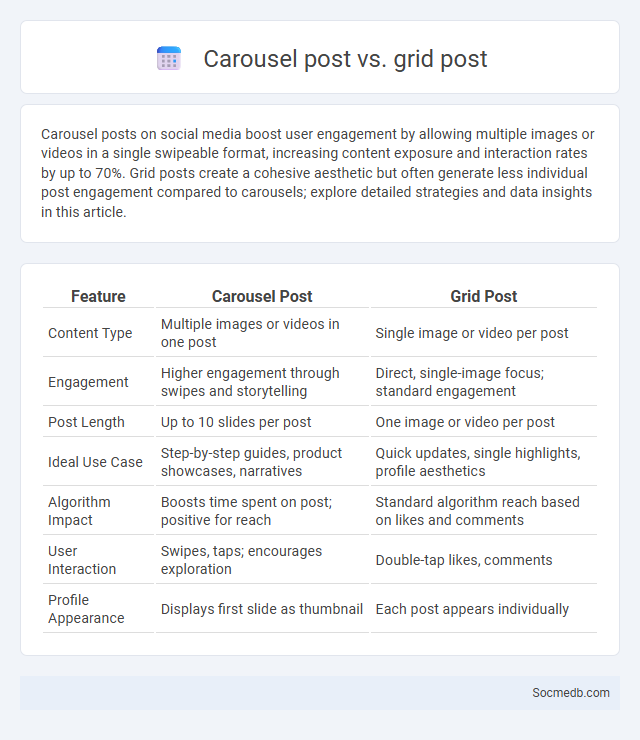
Photo illustration: Carousel post vs grid post
Carousel posts on social media boost user engagement by allowing multiple images or videos in a single swipeable format, increasing content exposure and interaction rates by up to 70%. Grid posts create a cohesive aesthetic but often generate less individual post engagement compared to carousels; explore detailed strategies and data insights in this article.
Table of Comparison
| Feature | Carousel Post | Grid Post |
|---|---|---|
| Content Type | Multiple images or videos in one post | Single image or video per post |
| Engagement | Higher engagement through swipes and storytelling | Direct, single-image focus; standard engagement |
| Post Length | Up to 10 slides per post | One image or video per post |
| Ideal Use Case | Step-by-step guides, product showcases, narratives | Quick updates, single highlights, profile aesthetics |
| Algorithm Impact | Boosts time spent on post; positive for reach | Standard algorithm reach based on likes and comments |
| User Interaction | Swipes, taps; encourages exploration | Double-tap likes, comments |
| Profile Appearance | Displays first slide as thumbnail | Each post appears individually |
Introduction: Understanding Carousel vs Grid Posts
Social media content formats like carousel and grid posts each serve unique engagement strategies, with carousel posts enabling multiple images or videos within a single post to enhance storytelling and user interaction. Grid posts present a series of individual images or videos arranged in a coherent layout, optimizing profile aesthetics and visual branding on platforms like Instagram. Understanding the differences between carousel and grid posts is essential for leveraging algorithmic advantages and maximizing audience reach.
What Are Carousel Posts?
Carousel posts are a dynamic format on social media platforms like Instagram and Facebook, allowing users to share multiple images or videos within a single post. These posts enhance engagement by enabling viewers to swipe through varied content, increasing the time spent on each post and improving message retention. Brands and influencers use carousel posts to showcase product features, tell a comprehensive story, or provide step-by-step tutorials, driving higher interaction rates compared to single-image posts.
What Are Grid Posts?
Grid posts are a visual strategy used on social media platforms like Instagram to create a cohesive and visually appealing profile layout by dividing a single image into multiple smaller posts. Each individual post contributes to a larger picture when viewed collectively on your profile grid, enhancing brand aesthetics and engagement. Using grid posts helps Your social media presence stand out by telling a story or showcasing products in a creative and organized manner.
Key Differences Between Carousel and Grid Posts
Carousel posts allow You to share multiple images or videos within a single post, enabling a more interactive and detailed storytelling experience. Grid posts present images in a static, organized layout on your profile, enhancing visual consistency and brand aesthetics. The key difference lies in user engagement: carousel posts encourage swiping through content, while grid posts create an immediate, cohesive visual impact.
Benefits of Carousel Posts
Carousel posts on social media platforms like Instagram and Facebook significantly boost user engagement by allowing multiple images or videos within a single post. These posts increase content visibility and dwell time, improving algorithmic favor and organic reach. Marketers leverage carousel formats to showcase product details, tell compelling stories, and drive higher conversion rates through interactive, swipeable content.
Advantages of Grid Posts
Grid posts on social media enhance your profile's visual appeal by creating a cohesive and organized layout, attracting more viewers and potential followers. This structured approach allows you to convey a consistent brand message and highlight key content in a memorable way. Utilizing grid posts effectively boosts engagement rates and encourages users to explore your entire profile for valuable information.
When to Use Carousel Posts
Carousel posts on social media are highly effective for showcasing multiple products, telling a step-by-step story, or providing detailed tutorials within a single post. Use carousel posts when you want to increase user engagement by encouraging swipes and interactions, particularly on platforms like Instagram and Facebook where visual content drives higher retention. Leveraging carousel posts during product launches, event summaries, or educational campaigns enhances content depth and boosts algorithmic reach.
When to Choose Grid Posts
Grid posts are ideal for creating a cohesive and visually appealing social media profile, especially on platforms like Instagram where aesthetic consistency attracts followers. Choose grid posts when promoting a product launch, event, or campaign that requires multiple images to convey a unified message. Utilizing grid layouts enhances brand storytelling and encourages user engagement by presenting information in a structured, digestible format.
Performance Comparison: Engagement and Reach
Social media platforms vary significantly in performance metrics, with Instagram leading in engagement rates due to its visual-centric content and interactive features like Stories and Reels, while Facebook offers broader reach across diverse demographics with optimized ad targeting. Twitter excels in real-time updates and conversation-driven engagement, making it ideal for live events and trending topics, whereas LinkedIn focuses on professional networking and B2B engagement with a highly targeted audience. Understanding these differences allows you to tailor your content strategy effectively, maximizing both your engagement and reach across platforms.
Choosing the Right Format for Your Content Strategy
Selecting the appropriate social media content format is crucial for maximizing audience engagement and message clarity. Visual formats such as videos and infographics generate higher interaction rates on platforms like Instagram and TikTok, while detailed articles and blog posts perform better on LinkedIn and Facebook. Tailoring content to platform preferences and audience behavior enhances reach and drives targeted traffic, improving overall content strategy effectiveness.
 socmedb.com
socmedb.com